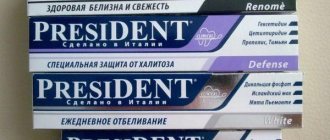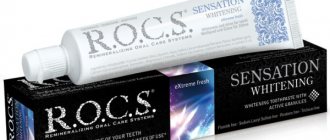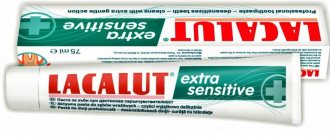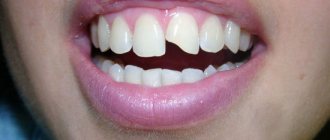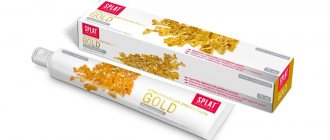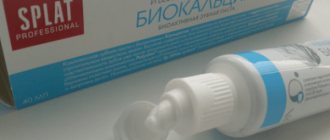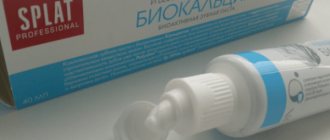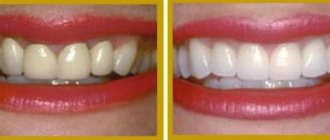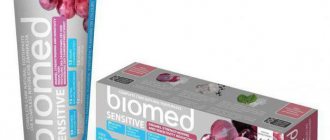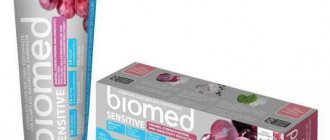Product Features
The main feature of all toothpastes produced in Thailand is their high efficiency. Compared to domestic analogues, they have the following advantages:
- The toothpaste contains exclusively natural ingredients. The pronounced anti-inflammatory effect declared by the manufacturer is achieved through the use of oils and plant extracts with a bactericidal effect. As a rule, these are mint and cloves. Exotic plants are also used: guava, miswaka, clinacanthus and others.
- Good abrasive force. The toothpaste contains abrasive substances that promote high-quality removal of plaque of natural origin (aluminum oxide, bamboo charcoal, soda).
- Use of aromatic additives. Almost every product has an exotic taste and smell.
- Wide variety of species. There are many similar products on the market, each of which is positioned to solve specific oral problems. Therefore, any consumer can choose a paste that meets their individual needs.
- Low cost. Due to their low price, the popularity of Thai toothpastes is increasing every year.
Oral care products from Thailand are fundamentally different from domestic products. They have a specific consistency, smell and special taste characteristics.
Rules of application
To achieve a positive result and avoid health problems, it is important to know how to use Thai toothpaste correctly.
As noted above, the foreign product differs significantly from the domestic one. First of all, its concentration. In order not to harm your oral health, you should follow the dosage recommended by the manufacturer. To carry out an effective procedure, you will need a small amount of product, equal in size to a match head.
When using whitening pastes, it is better to use a brush with soft bristles. The procedure itself can be repeated no more than 10 times every 30 days, so as not to harm the enamel. For ease of use, some manufacturers offer additional accessories, for example, special spatulas. With their help, it is easy to apply the paste to the brush in the required volume.
According to the instructions for Thai toothpaste, you need to store it in a place inaccessible to moisture and make sure that no water gets into the jar. It is also recommended to apply the cleaning composition to a dry brush.
Whitening pastes
Whitening Thai toothpastes are famous for their ability to remove tartar well. After using them, less plaque is formed, and your breath remains fresh for the whole day. The desired effect is achieved thanks to the composition of the product (plants of the lavender and asteraceae families, patchouli oil, camphor tree bark, etc.). It can be packaged either in jars with a solid composition of brown or gray color, or in tubes. In the first case, the consistency of the paste resembles a cream, and in the second, it resembles a gel.
Let's consider the most popular options for whitening Thai toothpastes:
- Punchalee. It has a pronounced whitening effect, strengthens enamel and nourishes soft gum tissue. This product has a Russian quality certificate, so it is freely sold in our country. In addition to plant components, the composition contains soda and calcium. Among the disadvantages, consumers note a specific taste and a pungent smell, which they have to get used to. The consumption is very economical: one package lasts for several months.
- Herbal Clove Toothpaste. Thai toothpaste under this trade name fights well against darkening of the enamel, prevents the active growth of bacteria in the oral cavity and freshens breath. According to reviews, within just two weeks of use, teeth lighten and acquire their natural shade.
You can use whitening compounds on a regular basis twice a day. To avoid overly aggressive effects on the enamel, it is better to repeat the procedure several times a week.
User reviews
My mother-in-law brought me toothpaste from Thailand. I was very impressed with how economical it was. I tried it, but I didn’t find anything positive or negative in it - neither any special whitening effect, nor bleeding gums.
Pasta is just like paste in a jar. My husband and I used it together for about 3 months. When it ended, we switched to the usual Splat. If they bring more, we’ll use it, but we won’t specifically ask for it.
Marina, 25 years old. Moscow city.
I bought a Thai whitening paste while I was on vacation. I was impressed by the white teeth of the inhabitants of sunny Thailand. I cleaned it regularly and within a week I noticed a whitening effect.
I was so glad! Exactly until my teeth suddenly began to hurt from the bite of a banal apple. I went online and read about the aggressiveness of such pastes. Now I don't know what to do. On the one hand, you really want to shine with a dazzling smile, on the other hand, you don’t want to sacrifice your enamel. You'll probably have to use it less often
Elena, 37 years old. Saint Petersburg.
But, despite conflicting reviews, Thai toothpaste is often brought from Thailand as a gift to friends and relatives.
Dentist review
There are no official reviews from dentists, but all of them, one way or another, indicate a lack of reliable information about the quality of the products. Below is one such opinion.
As a doctor with 15 years of experience, I would not advise overusing products from Thailand. Yes, their cosmetics have a healing, whitening, refreshing and anti-inflammatory effect, but you must follow the instructions for use and do not forget about the lack of certification of most of these pastes, and, therefore, the possible omission of some components in the composition.
Valery Nikolaevich T., dentist.
Thus, you should not switch entirely to using only Thai toothpastes and powders. The effectiveness and low cost of such products can result in costs for the treatment of damaged teeth, which is confirmed by reviews from users and dentists. But with moderation and caution, they can be successfully used for effective whitening.
Herbal pastes
Thailand is home to many unique medicinal plants that have a therapeutic effect on gum tissue. These include yuva tree powder, guava, and mangosteen peel. The Thais have learned to use them in the production of toothpastes.
Such compositions effectively relieve inflammation in the oral cavity, fight the active proliferation of pathogenic flora, stop bleeding, and have strengthening and nutritional properties. The components included in the composition have a gentle effect on tooth enamel. However, you should not expect whitening properties from such products.
The following herbal Thai toothpastes are most popular among consumers:
- Abhai herb. The product has an unusual dark color due to the presence of plant components. The specific taste pays off with disinfecting properties. The paste also copes well with most gum diseases.
- Baan Somjeed. This remedy can be used not only to treat and prevent gum disease, but also as a local anesthetic. The components included in the composition help relieve toothache.
- Twin Lotus Herbal Toothpaste original. The paste passed the relevant laboratory tests successfully and received a quality certificate in our country. It can be used for the treatment and prevention of periodontal disease and bleeding gums.
Characteristics of pastes from Thailand
When appearing on sale in Moscow, Thai products demonstrate a fairly high price, while in their native market they are very cheap - translated into Russian currency, the price of one jar rarely exceeds 10–15 rubles . Therefore, the price is attractive only for those who purchase products in Thailand in person.
In addition to the initial low price, Thai pastes have the following advantages:
- base made from herbal ingredients;
- pleasant taste and smell of Thai fruits, herbs, plants;
- economical consumption;
- variety of products;
- visible and tangible effect: brightening, refreshing, getting rid of plaque.
The natural composition is dictated by the use of a variety of natural ingredients, the introduction of each component is provided for a specific purpose:
- To remove hard deposits, Thai toothpaste contains soda. It is also added to products to relieve swelling of the gums and oral mucosa.
- The ingredients included bamboo charcoal, titanium dioxide and ground cuttlefish are responsible for polishing tooth enamel.
- Extracts and tinctures of mint, cloves, guava, and clinacanthus fight inflammation.
Some toothpastes contain borneol. It is used as a powerful antiseptic that has no toxic effect on the human body.
This is what a brightening toothpaste from Thailand looks like in the photo:
The main effect that buyers expect from toothpaste from Thailand is fast and clearly visible whitening. And some formulations can actually whiten teeth in a few days. But practice shows that after cleaning with such pastes, many users are forced to seek urgent dental care. Pain, intolerance to cold and hot foods, discomfort and burning in the gums are just part of a long list of complaints. Therefore, you should try a new product with caution, listening to your own feelings.
You should stop using the product at the first symptoms of intolerance: pain in the teeth, increased sensitivity of the enamel, tingling, burning in the mouth.
Black pastes
Black toothpastes from Thailand are not uncommon. They owe their color to bamboo charcoal. This natural component copes well with enamel stains by absorbing food particles. In addition to coal, the composition may include camphor, clove oil, and guava extract. They have a pronounced bactericidal and anti-inflammatory effect.
Special mention should be made of black paste, which is made from mangosteen bark. It comes in the usual tubes and has a pleasant smell and taste. At the same time, the product copes well with its stated functions: cleanses enamel from tartar and plaque, reduces the number of bacteria, and freshens breath. It is considered an excellent prevention of inflammation in the oral cavity.
Popular brands of Thai toothpaste
Since the tourist request “toothpaste, Thailand” has already become a kind of brand, the competition in the cleaning products market is quite strong. As an example, here are some of the most popular product samples.
Twin Lotus Active Charcoal
The product is based on bamboo charcoal, which is what determines the rich black color of the paste (no dyes are added!). The consistency of the mixture is gel, the packaging is a standard tube. Flavoring additives and aromas are not included in the composition of the product, so the paste is neutral in taste and smell. But in terms of the strength of the effect, Twin Lotus Active Charcoal has few equals. The tool easily copes with several functions at once, including:
- Cleaning the oral cavity;
- Long-lasting fresh breath;
- Enamel whitening;
- Preventing the formation of tartar;
- Fighting inflammatory processes;
- Strengthening oral tissues.
It is not surprising that this Thai paste is recognized as a real bestseller.
Twin Lotus Fresh Cool
Another representative of whitening pastes is black. It differs from previous options in its gentle effect, so this paste can be used without fear by people with sensitive enamel and gums. Eliminates dark plaque and tartar, prevents bleeding gums, quickly heals open wounds and provides the oral cavity with fresh breath for a long time. The paste is packaged in standard tubes, which simplifies the use and proper storage of the product.
Punchalee
Paste from Thailand Punchalee Herbal Toothpaste, according to the instructions for use, is officially certified in Russia. The product contains mangosteen bark, so the mixture acquired a characteristic blackish tint, as well as a very unusual taste and aroma. But despite the specific features, Punchalee toothpaste has gained great popularity, because the product has an anti-inflammatory effect and quickly copes with traces of plaque.
Herbal Clove
A jar of toothpaste from Thailand, whitening, but with an unusual black color, which is given to the mixture by the presence of mangosteen bark in the composition. The recipe also uses clove oil, menthol, bay leaf extract and other herbs. The product has a salty taste and a rather specific smell, so it is not recommended to give such a paste as a gift.
Although Herbal Clove has a very strong whitening effect. Therefore, by the way, there is a warning on the packaging about extremely careful use of the whitening paste in case of increased tooth sensitivity.
Pawan
Thai toothpaste with herbal extracts. The product helps eliminate tissue bleeding, has an antiseptic effect, and also easily copes with plaque from coffee and tobacco. In addition, consumers are guaranteed fresh breath and healthy microflora.
Abhai Herbe
Herbal paste from Thailand with a bactericidal effect: eliminates microbes, restores soft tissues, prevents the development of inflammatory processes. The composition includes extracts of clove, betel, mint, orange and guava, as well as aluminum sulfate and mangosteen bark. The product is packaged in tubes, the color of the mixture is brownish, the smell is herbal.
Rasyan
Another herbal toothpaste from Thailand. It has an antibacterial effect, whitens tooth enamel, removes tartar, enriches tissue with vitamins and restores healthy microflora. The product has a rich herbal taste and smell.
approximate cost
To purchase toothpaste from Thailand, you do not have to go to this exotic country. Today, such products can be bought in pharmacies or specialized retail chains, online stores.
The cost of the product will be slightly higher when compared with Thai prices. For example, Punchalee whitening paste will cost 250 rubles, and for the herbal composition Abhai herb you will have to pay a little more than 100 rubles. The final price may vary depending on the region. As a rule, it is much more profitable to buy Thai toothpastes in online stores, according to people’s reviews.
Where to buy toothpaste in Thailand
And to conclude the material, we’ll tell you where to buy miraculous Thai pastes. In addition to special stores with cosmetics and hygiene products, you can stock up on Thai powders and pastes in tubes or jars at any mini-market (Seven Eleven, Family Mart, etc.). In addition, toothpastes in Thailand are sold in pharmacy chains: a prime example is Boots and Watson's, known to every tourist. So there will be no problems with purchasing toothpastes and powders in the country. But you can only get Thai products from Russia with the help of intermediaries: either contact traveling friends, or buy Thai pastes in online stores. But in the latter case, we recommend that you carefully study the reviews about the seller.
Good health and happy shopping!
Consumer Opinions
Most consumers who have once tried black, herbal or pink Thai toothpaste do not want to return to traditional hygiene products. However, there are also conflicting opinions. Here are just a few of them:
- The product has a specific taste and smell. Some consumers quickly get used to them, others simply refuse to use them. The taste will definitely be appreciated by those who are still nostalgic for Soviet tooth powder.
- The manufacturer claims that the enamel paste is soft and non-traumatic. However, they are contraindicated for people with severe caries. It is better to try products with chamomile or guava extract. Thai toothpaste with cloves or borneol is suitable if there are no inflammatory problems.
- All products in round packaging have a whitening effect. However, it is not recommended to brush your teeth with them in the morning and evening; it is better to alternate with regular toothpastes. Also, do not rely on an instant whitening effect. Such products are really good at removing plaque, but they are not able to restore naturally yellowish enamel.
- Round packaging is only convenient if you take it on a trip. It is difficult to get paste onto a dry brush. If you wet it, water gets into the product, making it gooey and creamy. A special spatula often comes with the jar. However, reviews about it are very contradictory. Some consumers find it inconvenient, while others find it extremely useful.
- The cost of Thai paste is comparable to the usual mid-price products. Therefore, it is not worth purchasing a foreign product solely to save the budget.
Of course, you cannot be guided solely by consumer reviews when choosing a paste. Today, everyone can purchase a Thai product, evaluate its advantages and disadvantages, and only after that make their choice.
How to use tooth powder
To ensure that tooth powder does not cause harm, it is necessary to use it correctly:
- The composition should be selected in accordance with the condition of the teeth, gums, and existing diseases. For example, in case of some gum diseases, it is necessary to minimize the traumatic mechanical impact, so abandoning the paste in favor of the powder is not advisable.
- Highly abrasive products should be chosen only if you need to clean the enamel from heavy deposits and stains. They can be used by smokers to solve the problem of yellowing teeth.
- It is not recommended to use abrasives for daily hygiene. It is enough to clean once every 3-5 days, and for daily use, give preference to paste. This combination of products gives an excellent whitening and preventive effect.
- The powder easily absorbs moisture. This not only affects its properties, but can also cause bacteria to multiply. Do not dip your toothbrush in powder before use. The product must be diluted with a small amount of water to a paste-like consistency.
- To achieve maximum effect, brush your teeth with the powder for about 3 minutes. Experts recommend changing the product on the brush twice in one session. The brush should be soft, this will help reduce the mechanical load that the abrasive has. After finishing brushing, you can further brush your teeth with a non-abrasive toothpaste. This should be done if significant deposits are visible on the teeth, the enamel has darkened or stains have formed on it. Be sure to rinse your mouth very thoroughly.
Which is better - tooth powder or toothpaste? It is impossible to answer this question unambiguously. The choice depends not only on personal preferences, but also on the condition of the oral cavity. It is not always right to choose one of the means. In some cases, the greatest effectiveness can be achieved with the right combination.
Dentist reviews
Reviews of Thai toothpaste from dentists are in most cases negative.
First of all, doctors warn that many products have only a foreign quality certificate. In addition, they are adapted to the so-called Asian type of teeth. For Europeans, regular use of herbal formulations or whitening pastes is undesirable. If there is still a need to use them, it is better to alternate with traditional means.
Also, do not forget about precautions regarding the dosage of the product. Thai toothpastes in jars with a whitening effect are based on alumina with unprocessed granules. Therefore, they are a strong abrasive and can damage the enamel. Over time, teeth may become overly sensitive to cold/hot foods, and the enamel may even become dull.
The whole truth about toothpastes from Thailand: myths and reality
So we gradually came to the part of the review of Thai toothpastes concerning the various myths and rumors that surround these products. Let's see how true the most common ideas about these pastes are.
Myth 1: Toothpastes from Thailand are very useful because they have a natural composition.
Reality: There is no strict certification mechanism for toothpastes in Thailand. This means that, for example, only natural ingredients can be listed on a jar of paste, but the manufacturer will modestly keep silent about all the “chemicals”. In addition, the therapeutic effectiveness of many natural ingredients used in Thai pastes has not been medically proven. Guava, cuttlefish bone tissue and noni are a lure for lovers of the exotic and natural. Whether they help is a big and open question.
Myth 2: Thai toothpastes whiten teeth harmlessly.
Reality: As reviews show, Thai toothpastes do indeed whiten, but they are not always harmless to dental health. More often they are a kind of means for exchanging health for beauty. Teeth become white for a while, and then, due to wear of the enamel and vulnerability to bacteria, they begin to hurt and become damaged.
Myth 3: Thai pastes are healthier than regular Lakalyuts and Blend-a-Honeys.
Reality: Some components of many Thai pastes are the same as in the most common domestic or European ones. And in the case of abrasives, they are more harmful. Russian and Western manufacturers create pastes in which abrasives are prepared using special technologies that reduce the abrasive load on the enamel. These technologies are not used in Thai pastes, due to which the manufacturer saves on creating the product and ensures a low price. The healing properties of most exotic herbal extracts and supplements have not been scientifically confirmed.
Myth 4: Pastes from Thailand are so healthy that everyone buys them and recommends them to friends.
Reality: People buy Thai pastes because they are cheap and unusual. And also because, having excess profits on them, sellers have the opportunity to make good advertising. This includes ordering fake “reviews” on blogs and forums. The popularity of Thai pastes is an example of the fact that buyers are willing to buy low-quality goods, as long as they are exotic and cheaper.
As a result, it’s not worth buying Thai toothpastes with the goal of completely switching to using them instead of your usual dental care products. Such experiments can result in serious problems and costs for further dental treatment.
However, we are all human, and sometimes we really want to try something new. Well, this is quite possible, the main thing is without fanaticism, carefully and with a full understanding of the situation. With this approach, Thai toothpaste can do more good than harm.
If you have ever used toothpastes from Thailand in practice, be sure to leave your review at the bottom of this page.
Interesting video: review of the characteristics of whitening toothpaste from Thailand and features of its use
special instructions
There are several points that are important to consider when purchasing Thai toothpaste.
First of all, this is the quality of abrasive materials. They are responsible for removing plaque. Silicon dioxide, titanium dioxide, and aluminum oxide are usually used as abrasives. They are contained in clay, which is found everywhere. However, this is not a reason to use it instead of pasta. Before entering the finished product, the crystals undergo so-called cutting. Such a complex process must be performed on high-quality equipment.
The composition of Thai pastes includes ordinary alumina, saturated with a large number of raw crystals. For this reason, during hygiene procedures it is recommended to use soft brushes and brush your teeth with little force. It is not surprising that the plaque disappears, and the teeth themselves become smooth. Along with food debris, the enamel is also erased. As a result, teeth become sensitive to external irritants.
The presence of exclusively plant components in the paste requires the use of preservatives, thickeners and stabilizers. Therefore, it is not a 100% natural product. The use of natural ingredients is impossible without chemistry.
Sellers are trying to misinform consumers by talking about the super-effectiveness of the paste and its natural composition. At the same time, they are silent about possible side effects. Such products usually contain aromatic oils that can cause allergies.
On the other hand, sellers can scare consumers by talking about the unsafety of traditional hygiene products, citing a large number of chemical components. However, they cannot be absorbed into the blood through the oral mucosa. Few people know about this. Traditional pastes “work” only superficially, without having a negative impact on human health.
Do they really bleach?
Thai toothpastes actually whiten enamel, and in some cases the effect becomes noticeable within a few days after the start of use. We are talking about mechanical bleaching (lightening) of the surface of teeth by removing pigmented plaque from the enamel.
Review
“Toothpaste from Thailand is simply super! No other paste provides such whitening. At the clinic, they whitened my teeth with some special compounds, then covered the enamel with gel, and after that everything literally began to stick to my teeth. I drank coffee and my teeth darkened; I just ate and my teeth became even yellower. I was really scared. On the advice of a friend, I bought Thai toothpaste in a small jar, brushed my teeth with it for a week, and they became even cleaner than after the clinic. I really didn't expect it. True, this paste has a specific taste, but it’s worth being patient with.”
Olga, Moscow
However, such powerful whitening when using Thai toothpastes has its own negative properties - along with pigmented plaque, you can simply erase a layer of tooth enamel, exposing dentin. This, in turn, will lead to increased tooth sensitivity and a number of other problems.
Imagine the situation: a person’s teeth initially have increased sensitivity (hyperesthesia), there are wedge-shaped defects in the cervical area, and he frantically brushes his teeth twice a day with a hard toothbrush using whitening Thai toothpaste. In general, to put it mildly, nothing good will come of this and, most likely, such a person will soon end up in the dentist’s chair.
Many toothpastes from Thailand contain alumina as an abrasive substance. Even if it is not explicitly indicated in the composition, in the list of components you can often find titanium dioxide, aluminum oxide and silicon dioxide - the components of clay. Sometimes they simply write: “white clay.” Moreover, not a single paste indicates that during its preparation the abrasive component underwent a special treatment to round the corners of the crystals, which would ensure less damage to the enamel when brushing teeth.
It is also useful to read: Asepta toothpastes: composition features and reviews of their use
Obviously, after brushing your teeth with such a “clay-containing” composition, the layer of plaque along with a certain amount of enamel will be literally torn off by abrasive components. The visual effect is obvious - the teeth will really become white. And at the same time, they will begin to get sick and react sharply to cold, hot, sour, and even to simple chewing of rough food.
However, if your tooth enamel is naturally healthy, if you don’t know what tooth sensitivity is, and you don’t have wedge-shaped defects, but there is a layer of so-called “smoker’s plaque” and tartar, then careful and rare use of whitening Thai teeth pastes can be considered quite safe.
Review
“In the wake of all this hype with Thai pastes, I bought myself a jar. How beautifully they write about natural ingredients and herbs! But in fact, when I dug deeper, I found out that it contains sodium lauryl sulfate. The same one that is used in cleaning products, which foams and from which stomatitis develops. So much for the natural composition. I started to understand further. In reviews, people write that the paste really cleanses, but after it the teeth become sensitive. This is already a complete hello. That is, it’s not a paste, but just some kind of liquid sandpaper. What can I say about my experience? There is no experience. I took a little on my finger, soaked it, saw how it lathered and foamed, so I immediately threw the whole jar away, I didn’t take any risks.”
Tatyana, Moscow
